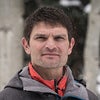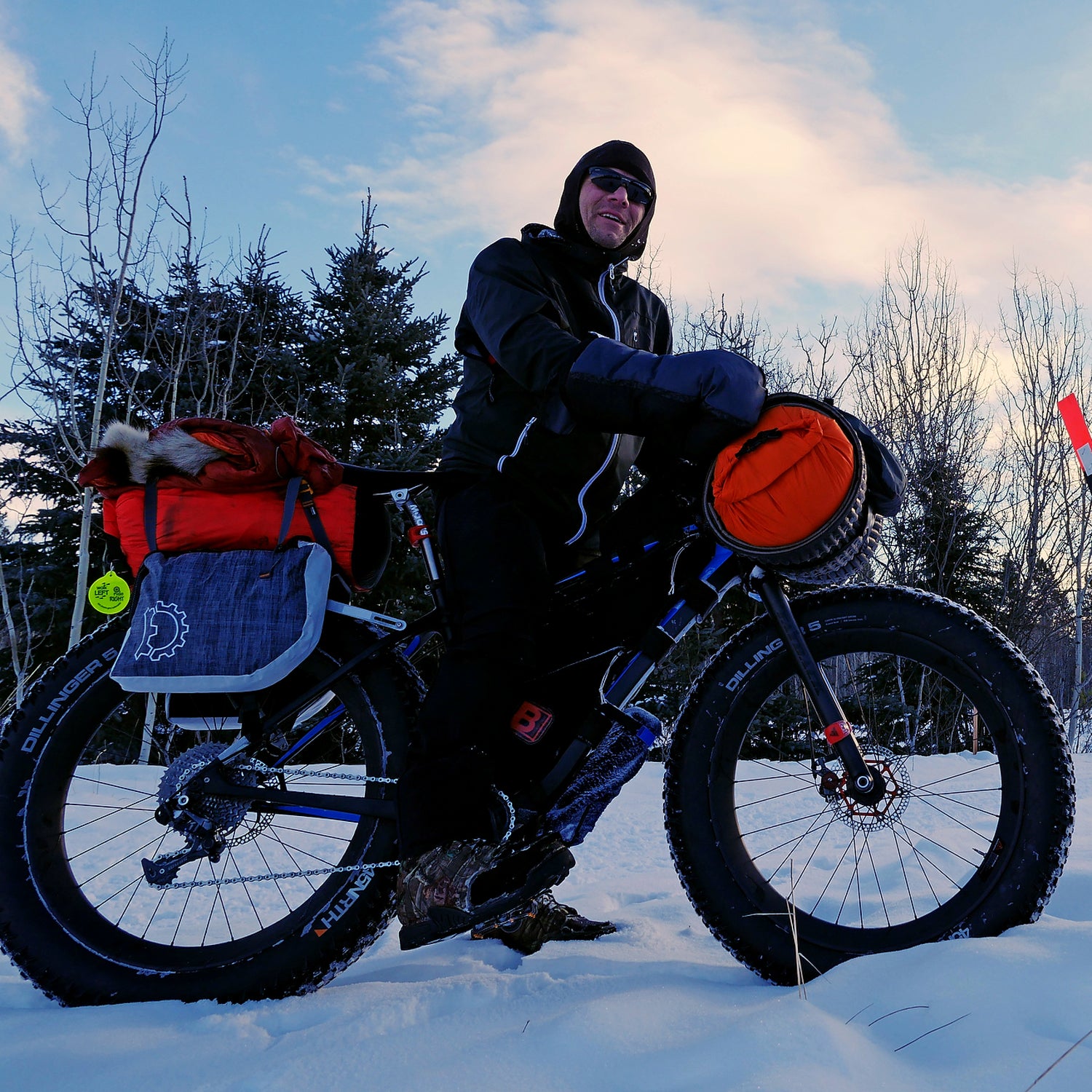Until this week, no one had ever ridden the 1,000-mile Yukon Quest┬Ārace course on a bike. The sled dog race is known as one of the toughest competitions on earthŌĆöitŌĆÖs a two-week slog through snow and ice and over remote ranges from Fairbanks, Alaska, southeast to Whitehorse in the Yukon Territory.
Then Jeff Oatley, a civil engineer and renowned fat-bike racer from Fairbanks, pedaled his fully loaded rig across the finish line on Tuesday, becoming the first person to do so. It took him just over 16 daysŌĆöabout a week longer than it takes the raceŌĆÖs top dog┬Āsledders. He pedaled between 12 and 18 hours each day, covering anywhere from 40 to 80 miles at a time.╠²It wasnŌĆÖt OatleyŌĆÖs first rodeo: the 46-year-old began riding fat bikes in 2000, he twice won MinnesotaŌĆÖs prestigious Arrowhead 135 winter race, and he holds┬Āthe record for the 1,000-mile Iditarod Trail Invitational (10 days, 2 hours, 53 minutes).
The Quest marked a personal triumph for Oatley.╠²A close friend of his died┬Āin a hunting accident in November and the blow┬Āleft Oatley reeling. Out of shape and struggling to come to terms with his grief, Oatley knew he needed a spark. ŌĆ£I was hanging out, drinking whiskey with a friend around New YearŌĆÖs, and just was like, ŌĆśI gotta do something. Fuck it, IŌĆÖm going to ride the Yukon Quest trail,ŌĆÖŌĆØ he told ╣·▓·│į╣Ž║┌┴Ž.
ŌĆ£I was hanging out, drinking whiskey with a friend around New YearŌĆÖs, and just was like, ŌĆśI┬Āgotta┬Ādo something. Fuck it, IŌĆÖm going to ride the Yukon Quest trail.'”
Taking on the trail is easier said than done. Here, Oatley discusses how he did it, why he didn't bring a tent, and what it's like┬Āspending two weeks alone in North AmericaŌĆÖs most desolate landscape.
OUTSIDE: What's it like┬Āriding an 80-pound bike for 16 straight days on snow?
ŌĆŗOATLEY:┬ĀI guess if youŌĆÖre not interested in seeing the country that youŌĆÖre going through, then thereŌĆÖs probably not much for you. The Yukon Quest is a dog race that IŌĆÖve followed pretty closely, and itŌĆÖs tough country, but itŌĆÖs beautiful. It just so happens that the only way for me to do it is on a bike. I was high as a kite when I finished.╠²I had a freakinŌĆÖ amazing trip. It was more beautiful and way better than I expected it to be.
What separated this from other long rides youŌĆÖve done in winter?
The Quest is a different animal. The terrain is harder and the weather is potentially more dangerous than on the Iditarod Trail, especially for a human-powered racer. Just because you canŌĆÖt carry the weight that the mushers carry out there, yet youŌĆÖre traveling through this country that can be minus┬Ā60 degrees. My bike weighed almost 80 pounds.╠²You canŌĆÖt go into that country with a light bike, because you wonŌĆÖt have the gear you need if the weather goes sideways. ItŌĆÖs too risky.
Were you pitching a tent to sleep?
I didnŌĆÖt carry a tent. I think I slept outside three or four nights, with a sleeping bag on the ground. Every other night I got to some kind of shelter, like a shack or abandoned cabin or a trapperŌĆÖs cabin. Three nights in a row, I stayed with people who live out in that country, whoŌĆÖve been there for 40 years. ThereŌĆÖs a network. They knew I was coming.
How much did you end up walking?
I got lucky with trail conditions. I certainly walked more than 50 miles, but probably less than 100. And the longest stretch that I walked was only about five miles. It was a whiteout from a really dense cloudŌĆöyou couldnŌĆÖt see anything. There was a good trail, but I couldnŌĆÖt maintain my balance well enough to stay on my bike. So I just had to walk and feel the trail.
How do you handle the isolation? What do you think about?
I hit these really lonely, far-out-there sections. ItŌĆÖs remote. Especially in the winter. Some of that country sees some people in the summer, but in the winter, thereŌĆÖs nobody out there. I was just like, nobody gets to experience this. The mushers donŌĆÖt even get to be that alone out there. Going up to Yukon, the northern lights were going off. I was having the time of my life. YouŌĆÖre surprised by the sound of your voice when you start talking again.
Did the ride help you sort through your grief?
I donŌĆÖt know if it did or not yet. But I didnŌĆÖt do this as a tribute to Brian, or dedicate it┬Āto him, or anything like that.╠²I did it for me. I just needed some time and felt like I had to get moving again. I thought about him a lot on the trail, but it wasnŌĆÖt really extra motivation. IŌĆÖm plenty motivated. One of the reporters at the finish asked me, ŌĆ£Did you ever think about quitting?ŌĆØ No, man. At one time I was thinking it would be sweet if I could ride back to Fairbanks when I finished, just so I could stay out there longer.


